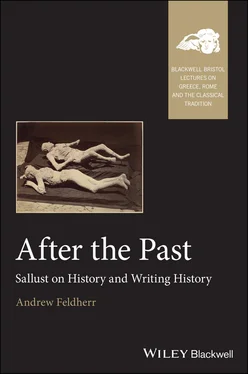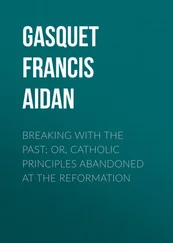The six chapters that follow illustrate how various aspects of Sallust’s works construct contrasting perspectives on the Roman past and trace out some consequences of these alternatives for the reader. I aim to show how different ways of understanding the continuities and trajectories of Roman history in equal measure create and depend upon readers’ perceptions of their own position in relation to the res publica and of how the actions of writing and reading history are themselves a part of history. The first chapter continues the work of the introduction by focusing on the depictions of time in the Catiline . It correlates divergent ways of locating the conspiracy in time with Sallust’s disorienting choice to begin the work by asking questions that seem more philosophical than historical. Because the internal discursive rivalry Sallust sets in motion parallels the prominent alternatives available for the literary self-expression of Sallust’s peers and contemporaries, these internal questions about the composition and emphasis within Sallust’s narrative lead also to judgments about the author’s own political and ethical choices. The topic of the second chapter, which again concentrates on the Catiline , will be Sallust’s positioning of historiography in relation to its greatest generic rival of all, rhetoric. The idea that classical historiography was itself a fundamentally rhetorical enterprise has provided the enabling premise for most literary analyses of the genre over the past thirty years, but here I argue for the importance of maintaining the distinction between rhetoric and historiography in Sallust’s narrative. A crucial catalyst for the reader’s engagement with the experiences depicted in any historical narrative is the historian’s representation of and attitude towards emotions such as pity, and, especially important to Sallust, envy, and this will be the topic of the third chapter. Ancient treatments of the role of the emotions in historical writing often include a comparison to tragedy, and Chapter 4studies the allusions to tragedy in the Jugurtha in this light, arguing that tragedy provides an important framework not only for understanding the course of events in the narrative but for dissecting the potential impact of Sallust’s own work on its audience. The depiction of space in the same monograph will be the topic of the next chapter, which connects Sallust’s techniques of representing both the landscapes of the battlefield and the imagined geography of Africa as a whole with the differing conceptions of historiography set forth in the first chapter. The final chapter considers the status of Sallust’s works as textual artifacts by analyzing the representation of writing in both monographs.
As this summary shows, the book as a whole is unified by a way of understanding the political dimensions of how Sallust has constructed his narrative, how an impression of distance from and proximity to the events described prompts reflection on both author and audience’s engagement with public life. It also presumes an openness about the interpretability of historiography as a genre that may be surprising, especially in light of the way a modern historian like Syme might identify the success of his work with the cogency of the final judgment it offers of the past. The antithesis and ellipses that characterize Sallust’s style also place a special interpretative burden on his readers. Sallust’s antithetical presentation of his subject extends to the inclusion of opposed interpretations of events, like those of the witnesses to Catiline’s defeat. Individual audience members will make different assumptions about whether these alternative voices constitute mere foils to Sallust’s, rival visions the historian expects to be rejected, or whether they are powerful enough to challenge the historian’s own historical representation.
Whether or not such challenges were intended by the author, and whether, if they were not, they can nevertheless be made part of a reader’s interpretation of the work, are issues that require further choices on the part of the audience. I consider it axiomatic that each reader will negotiate these possibilities differently, seeing for example Catiline as Sallust’s historiographic rival and Caesar as his ally, and for that reason I try to focus my argument on the implications of such decisions rather than treating dissonance and ambiguity as problems to be solved or setting limits to texts’ interpretability.
The circumstances that may have encouraged such reflectiveness among Sallust’s audience include not only the many and contradictory political positions inspired by the events Sallust describes but an equally revolutionary diversity in the media through which those events were represented. 25While history had been written in Rome for close to two centuries before Sallust began to write, Cicero’s repeated complaints that the genre had not yet reached an adequate literary form give evidence of a contemporary rethinking of what the aims of the genre should be (see Chapter 2). His particular insistence that the author should manifest his oratorical skills reminds us not only of the literary imperialism of rhetorical training but that history had already been rhetoricized in the public oratory of the period, both as a source of precedent and thanks to the inevitable role of narrative in forensic and deliberative speeches as well as epideictic ones. Changing distributions of power in Rome encouraged monographic treatments focusing on single actions, often, at least to judge from Cicero’s plans, on the deeds and experiences of a particular individual. 26The overlap of public authority and authorship took new forms in the proliferation of memoirs and autobiographies; those of Sulla and Caesar were especially important examples. 27Varro’s writings on Roman institutions and the Latin language also constitute a historiographic project, and several of Cicero’s treatises represent history in their richly significant dramatic settings and also take historiography as a foil for their distinctive applications of Roman historical traditions to address general questions about ethics and politics. 28Beyond the competition among such literary forms of representing the past, and my list could be considerably expanded, public monuments and spectacles, including triumphs and dramatic performances, also offered distinctive ways of experiencing recent events and placing them in history. Each of these media put forth its own claims about the shape of the Roman past, why and to whom it mattered, and related its representations differently to the expression of political authority. The chapters that follow will argue that specific contrasts to competing ways of portraying history play important roles for Sallust and his readers in defining the effect of his own works. My point here is to stress how the proliferation and diversity of historical representation in general made such questions inevitable and necessary. 29
While I have not set out to offer a general introduction to Sallust or provide an overview of all the important aspects of his writing, I hope that the variety if not the comprehensiveness of the textual features brought into the orbit of my approach will contribute to a reader’s sense of the richness of his work. The topics I have chosen are also ones that have attracted a lot of general attention from scholars of ancient historiography: intertextuality, constructions of space, the role of the emotions in historical narrative, and above all the relationship between history and rhetoric. And, though focused on Sallust, the discussions here aim to contribute to these ongoing debates. One important limitation of the book’s scope comes from my decision to leave out of account the fragments of Sallust’s Histories , his final and most ambitious project as a historian. These fragments are substantial enough to suggest tantalizing connections with the issues I foreground in the monographs, but to attempt to use them to illustrate and advance my approach would have required far too much speculation and supplementation. No reference will be found either to the treatises offering advice to Caesar or the invective against Cicero also attributed to Sallust. This is worth mentioning because, if genuine, these treatises might be thought to give access to the real views of the historical Sallust and so contribute to interpretations of the monographs based on authorial intention. I am, however, sufficiently persuaded that all of these works are later rhetorical exercises not to feel the need to engage with such arguments. 30My readings also frequently presume an intertextual relationship between the two monographs, so that echoes of the language of the earlier Catiline become meaningful as such within the Jugurtha and, conversely, allow for it to be reread through the lens of the latter work. It is in the nature of such arguments to be circular in that the meanings discovered by presuming such connections are the most powerful evidence for their presence, but they are, equally, irrefutable. 31
Читать дальше












